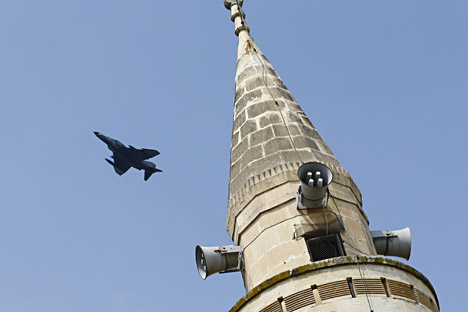
Turkish Prime Minister Ahmet Davutoglu has said that a drone shot down by the Turkish air force on Oct. 16 was made in Russia. Source: Reuters
ReutersTurkish Prime Minister Ahmet Davutoglu said on Oct. 19 that a drone shot down by the Turkish air force on Oct. 16 was made in Russia, the online newspaper Vzglyad reports.
"The downed drone is Russian-made," Davutoglu told the A Haber television channel.
"But Russia has told us that it doesn't belong to them. It may belong to the al-Assad regime, Syrian Kurds or other forces."
The Russian Defense Ministry said as early as Oct. 16 that the Russian air force had suffered no losses.
Denis Fedutinov, a UAV (unmanned aerial vehicle) expert and the chief editor of the Russian website UAV.ru, does not rule out that the downed aircraft did belong to the Syrian army or Kurdish guerrillas.
"Russia has already delivered unmanned systems to Syria," he told Vzglyad.
"In particular, it supplied Pchela drone systems, a rather old development dating back to the Soviet era. However, according to some reports, short-range Eleron-3 drones have also been supplied in recent years.
"Essentially, these two facts suggest that Moscow has experience of working with Damascus in the supply of such equipment. In principle, we cannot rule out the delivery of any other systems, too."
He admitted that he still could not recognize the aircraft in the photograph released by the Turkish authorities.
"My colleagues and I carefully looked at the pictures. We have not seen such a system at any public events. I think it is an undisclosed development," he said.
The United States has announced that it is ready to sit down at the negotiating table over issues related to Syria, the business daily RBK reports. Speaking in Madrid on Oct. 19, Secretary of State John Kerry announced plans to hold consultations with the participation of Russia, Saudi Arabia, Turkey and Jordan.
A source in the Russian Foreign Ministry confirmed receiving an offer from Washington to join the talks, but the format and content of the consultations have not yet been determined.
"This is now being considered," the source said. The U.S. Embassy's spokesman Will Stevens noted that Washington and Moscow were consulting on "technical issues and flight safety in order to ensure that we do not see any conflict between the U.S. and Russia in the air."
Last week, Russian President Vladimir Putin said that he had proposed to Washington to hold extensive talks on the Syrian issue – the Russian delegation was to be headed by Prime Minister Dmitry Medvedev. The U.S. refused. Stevens did not elaborate on why Washington had changed its mind.
According to Leonid Isayev, a political scientist at the Higher School of Economics in Moscow, each party wants to hold the initiative in resolving the Syrian crisis; it is a "matter of image."
However, Isayev added that both sides understand that the question of the resignation of Syrian leader Bashar al-Assad is “not on the immediate agenda.”
"It is about image,” he said. “President Putin has personally backed al-Assad and will not give up on him, while the U.S. and its allies have relied on the Syrian opposition and, no matter how ineffective it may be and how much its supporters desert, they will not give up on it."
The opening of the new American Center in Moscow took place on Oct. 20, the business daily Kommersant reports. It is now on the premises of the U.S. Embassy.
As explained by the embassy's spokesman Will Stevens, the new American Center will hold cultural and educational events. It will also provide access to online libraries and the U.S. media.
The move was a forced measure after the Russian authorities had decided to close down the American Center at the Rudomino Library of Foreign Literature in Moscow in mid-September.
According to Stevens, Washington believes that it is "part of the Russian authorities' systematic efforts to isolate the Russian citizens from the rest of the world."
"For example, in 2014, Russia cancelled the FLEX student exchange program, which allowed more than 8,000 Russian school students to live and study in the United States for a year," he said.
"In 2013-2014, the Russian authorities closed down all the 29 ‘American Corners’ that existed in the libraries in the regions of Russia."
The former American Center will be replaced by the library's North American culture department. The cultural centers of other countries (Azerbaijan, Bulgaria and the UK) will continue their work in the old format.
All rights reserved by Rossiyskaya Gazeta.
Subscribe
to our newsletter!
Get the week's best stories straight to your inbox